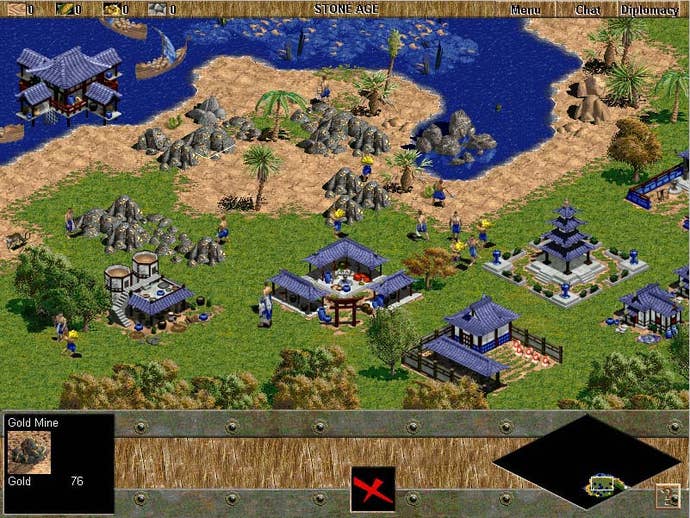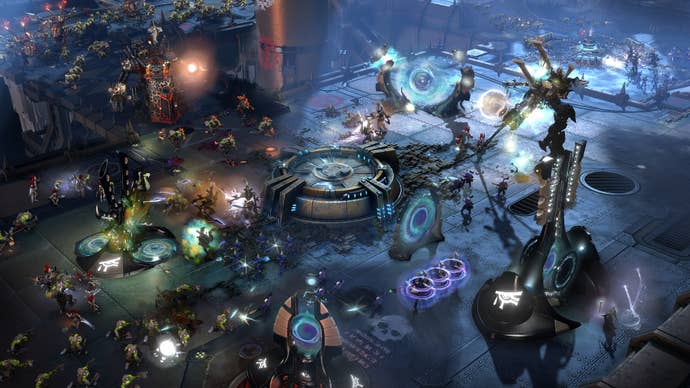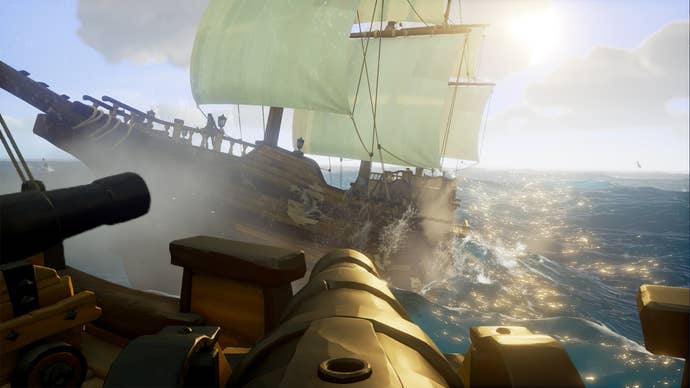Finding Value in Supposedly Outdated Games
STARTING SCREEN | On what we can learn from Age of Empire's new release, Ni No Kuni 2, and more.
This article first appeared on USgamer, a partner publication of VG247. Some content, such as this article, has been migrated to VG247 for posterity after USgamer's closure - but it has not been edited or further vetted by the VG247 team.
We're pretty busy with all of this week's big games and the advent of GDC, so we invited contributor Doc Burford to handle the column this week. Here's what he has to say about Age of Empires and how classic games can still offer a fresh perspective.
Until its announcement last fall, I assumed that Age of Empires was lost to time. Each one of its sequels eventually made their way to Steam, remastered to play on modern systems, but Age of Empires, the game that started it all, was nowhere to be found. I've been looking forward to its release since it was announced, and I've had a great deal of fun returning to my old haunts. But something bugs me: people keep acting like it's too old to matter.
So many reviews I've read and friends I've talked to have responded to my favorite strategy game with befuddlement. You can find better competitive multiplayer in more modern games, they say. Other games have more diverse empires or unique missions. The game is old. Dated. It doesn't matter anymore.
I'm inclined to disagree.
Age of Empires 2 is the clear fan favorite in the series, and always has been. It improved on its predecessor in nearly every way imaginable. It added more technologies, empires, and campaigns, introduced new mechanics like garrisoning, gave town centers a way to defend themselves, let players queue up technologies, units, and even farms as they saw fit. It seems like an improvement in every way, so you may wonder, as some reviewers have, why anyone would ever want to return to the original.

In the years since Age of Empires 2's release, the genre has evolved. StarCraft became an esport. The Total War games introduced huge, sweeping campaign elements, while Company of Heroes pushed players towards tighter, more micro-focused combat. Age of Empires missions are long, but RTS developers see a future in shorter matches. Dawn of War 3, one of the highest-profile strategy releases of 2017, featured strong MOBA influences, barely paying lip service to the base-building of its predecessors.
Age of Empires was ten years old when Company of Heroes was released to nearly universal acclaim. Relic's WW2 masterpiece is ten years old now; now, like Age of Empires, it's a legendary game in its own right, inspiring plenty of new strategy games. So why go back to Age of Empires? If its sequel did everything better, and the genre has changed so much since then, what does Age of Empires have to offer us? What can it do that they can't?
It's important to understand how different Age of Empires is from other strategy games. Games like Company of Heroes 2 and Dawn of War 3 are all about capturing hardpoints on the map to gain resources. The Total War series is a massive turn-based game with real-time battles. StarCraft 2 pushes players into conflict as quickly as possible, with clear lanes on the resource points that limit player base-building.
Age of Empires is not a game about combat.
Oh, sure, it has combat, but that combat is evenly mixed with other forms of gameplay. Missions in Age of Empires are about building Wonders and capturing relics as much as they are about military expansion. It emphasizes resource gathering and technological research as pillars of the player experience, sometimes more than combat. In fact, Age of Empires has as much in common with other strategy games as it does with city-building series like Tropico or Caesar or 4X games like Civilization and Sins of a Solar Empire.
It's a strange hybrid, something that can be a peaceful, relaxing experience about farming and fishing, that gradually morphs into a game about building walls around your cities and your empires, before finally turning into an all-out war against enemy tribes and empires.
Age of Empires is, in a word, cozy. I've played hours of the game without a single military unit or building, focusing instead on perfecting my economy. Dawn of War 3, which I've been playing at the same time, is more about sending hero units and their allies through a series of largely linear, forgettable missions. With Relic's latest, there's a sense that if you aren't moving forward every second, you're wasting time. It's unique, it's fun, and it's just as interesting as its sequel, even if the pathfinding isn't as good and you can't queue up farms.
When George Miller surprised us with Mad Max: Fury Road after years of making films about cute animals, many people wondered how someone could make such an incredible advancement in filmmaking. A friend told me that someone asked Miller this question at a screening, and Miller explained that his bible when making Fury Road was a book called The Parade's Gone By, which is a history of silent filmmaking. Rather than do something that had never been done before, Miller looked at how silent films conveyed information and used that to make Fury Road's action clear and vibrant.

As an artistic medium, video gaming is unique because it's tied to computing, the most rapidly-advancing technology in human history. Every generation of computing technology opens up new frontiers to game developers. Microsoft Flight Simulator's motto was "as real as it gets." Sega boasted about the power of Blast Processing. Every new game had to have some new bullet point on the back of the box.
I can't help but feel that this has shaped our values as gamers. We expect the next game to be bigger and better than the last, but is that really what we want? For years, it seemed like Call of Duty was the only model of shooter anyone would buy. In 2015, Ubisoft released Rainbow Six Siege, which has since become one of the most popular shooters in the world. Tactical shooters like Siege fell out of favor after Call of Duty 4's release in 2007, and it seemed like they'd never come back, but they did, because they were still great games that people wanted to play.
Age of Empires might not be as focused on micromanaging military units as Company of Heroes, but that doesn't make it any less valuable. Ensemble created a cozy strategy game, a different creature than the games that followed. It doesn't matter if a game is new or old; the only thing that matters is whether the game is fun, and Age of Empires certainly is.

This Week's Notable Releases
- Sea of Thieves [March 20]: Microsoft's big Xbox One exclusive finally launches this week. It's been derided in some corners for not living up to the standard set by other exclusives, but its unique brand of co-op seems to be finding a niche on outlets like Mixer. Will it be one of 2018's sneaky breakout hits? We'll have to see.
- Assassin's Creed Rogue Remastered [March 23]: The remaster of Assassin's Creed Rogue is out this week, though hardly anyone will be paying attention. The original Rogue wasn't particularly notable, earning weak reviews as it catered to those who were reticent about upgrading to the current generation. But if you miss the sailing from Black Flag, then this game may be the one for you.
- Detective Pikachu [March 23]: Speaking of sneaky breakout hits, there's also Detective Pikachu, which looks to be a charming little adventure game set in the Pokemon universe. Nadia already seems to be all into it. As for me, I think Detective Pikachu may have some interesting implications for the Pokemon Switch generation that's likely due next year. One to watch in any case.
- A Way Out [March 23]: A Way Out was one of the few games to spark excitement at least year's EA showcase at E3. It's another game with a unique brand of co-op, featuring a split-screen approach in which two players can be in very different places at the same time. Looks like a great game to play with your significant other.
- Ni No Kuni 2 [March 23]: Ni No Kuni 2 reviews finally dropped today, and critics have generally been high on it. Personally, I thought it was hurt by its mandatory fetch quests, but I can certainly see the appeal for old-school JRPG fans. RPG fans are blessed to be living in a new renaissance period for the genre.
Nadia's Note Block Beat Box: The Edge of Green from Radiant Historia: Perfect Chronology
I spent most of my weekend ripping back and forth through time by way of Radiant Historia: Perfect Chronology for the Nintendo 3DS. It's not easy screwing up the time stream and then trying to repair my "Whoopsies," but at least Atlus gave me a good soundtrack to work by.
I'm especially fond of The Edge of Green, the game's boss fight theme. It's got a frantic pace that suits a tough RPG like Radiant Historia. This is a game where every move you make in a boss battle counts, especially since you're rarely up against a single enemy. If you're not careful, if you enter commands a bit too recklessly, you'll be tasting the grass on that aformentioned Edge of Green. Great game, though. We talked about it on Axe of the Blood God a couple of weeks ago.
Mike's Media Minute
There was some scant hope that Tomb Raider might be the film to break the curse of the video game movie. The director looked to be excited about the project and star Alicia Vikander was a solid fit for the rebooted version of Lara Croft. In the end though, despite Tomb Raider being on of the highest rated video game film on Rotten Tomatoes, that doesn't mean it's good. The film bowed with a $23 million domestic haul (bad), but ended up being saved by the international take, bringing in $128 million worldwide.
That low domestic take means that Black Panther spent another week at number one, bringing that total to five consecutive weekends in that spot. Only two other films have hit that mark in the last 19 years: Avatar and The Sixth Sense. Oh, and Black Panther has surpassed $600 million domestically. Worldwide, it's at #14, right behind Iron Man 3 and The Fate of the Furious. That's pretty good for a film whose estimates were around the $700 million mark before release.
The film that might break the video game film adaptation curse is Rampage. That film is coming on April 13, 2018, based on the old arcade game by Midway Games. It stars Dwayne "The Rock" Johnson, whose video game-adjacent Jumanji: Welcome to the Jungle just hit $400 million domestic. It's $3 million short of being Sony Pictures best-selling film in the United States ever behind the original Spider-Man and it's around $60 million short of a cool billion, with a Japanese release on the horizon. If Rampage can review and perform anywhere near Jumanji, we might have the best video game adaptation ever?
With Rampage. Roll that one around in your mind for a bit.
This Week's News and Notes
- GDC begins this week! Matt, Caty, and I will be out all week attending sessions, conducting interviews, and trying out new games. Naturally, all of this will be happening in the course of one of the biggest release weeks of the year. Fun!
In all seriousness, GDC is consistently my favorite show of the year. It's the one of the year that journos and game devs actually get to mix in a really meaningful way. The original purpose of GDC has been eroded over the years, but the core of just learning about games has managed to remain intact.
Should be a busy and interesting week regardless. If you happen to be near the Moscone Center and you see one of us, make sure to say hi! - Ni No Kuni 2 review embargos lifted this morning, and I seem to be in the minority in my opinion on it. I think this sums up my feeling on it pretty well.
- We all got to see God of War last week, and previews have been popping up across all of the major sites. I found myself mostly thinking about how God of War has changed over the past decade, and how badly it was in need of a fresh perspective. At a minimum, the reboot should provide that. As an old-school fan of God of War, I'm willing to put aside my cynicism about its attempts to ape Sony's current triple-A darlings and give it a fair shake.
- Fortnite has now sold a zillion copies on mobile despite limited availability. Here's my line in the sand: I prefer PUBG. I find its stark realism and larger maps much more appealing than Fortnite's cartoony outlook, and I don't like the building mechanic. The only problem is that PUBG has been completely overrun by hackers, and it just hasn't been receiving enough updates. Plus, Fortnite is free. I don't think PUBG will ever close the gap that Fortnite has opened—it's a bonafide sensation now—but I remain hopeful that PUBG will at least address some of the problems that plague it. Or get a new map. A new map would be nice, too.
- Geralt is the best Soul Calibur 6 guest character since Link. Full stop. Perfect addition to the cast.
- In the wake of Donald Trump watching a clip containing a handful of out-of-context violent video game scenes, we couldn't resist putting together a follow-up of our own.
- Caty's piece about the new beef between hip-hop artists who favor PUBG over Fornite might be my favorite thing we ran last week. Things have changed a lot since the days of Biggie and Tupac, haven't they?
- The USgamer Podcast: Mike and Nadia team up to review Kirby Star Allies and discuss the Shadow of the Tomb Raider leaks in the latest episode of our flagship podcast! Subscribe here!
- Axe of the Blood God: I reviewed Ni No Kuni 2 with Nadia! We have things to say about its politics, its similarities to Suikoden 2 (or lack thereof), and its battle system. Download it and have a look. Subscribe here!


